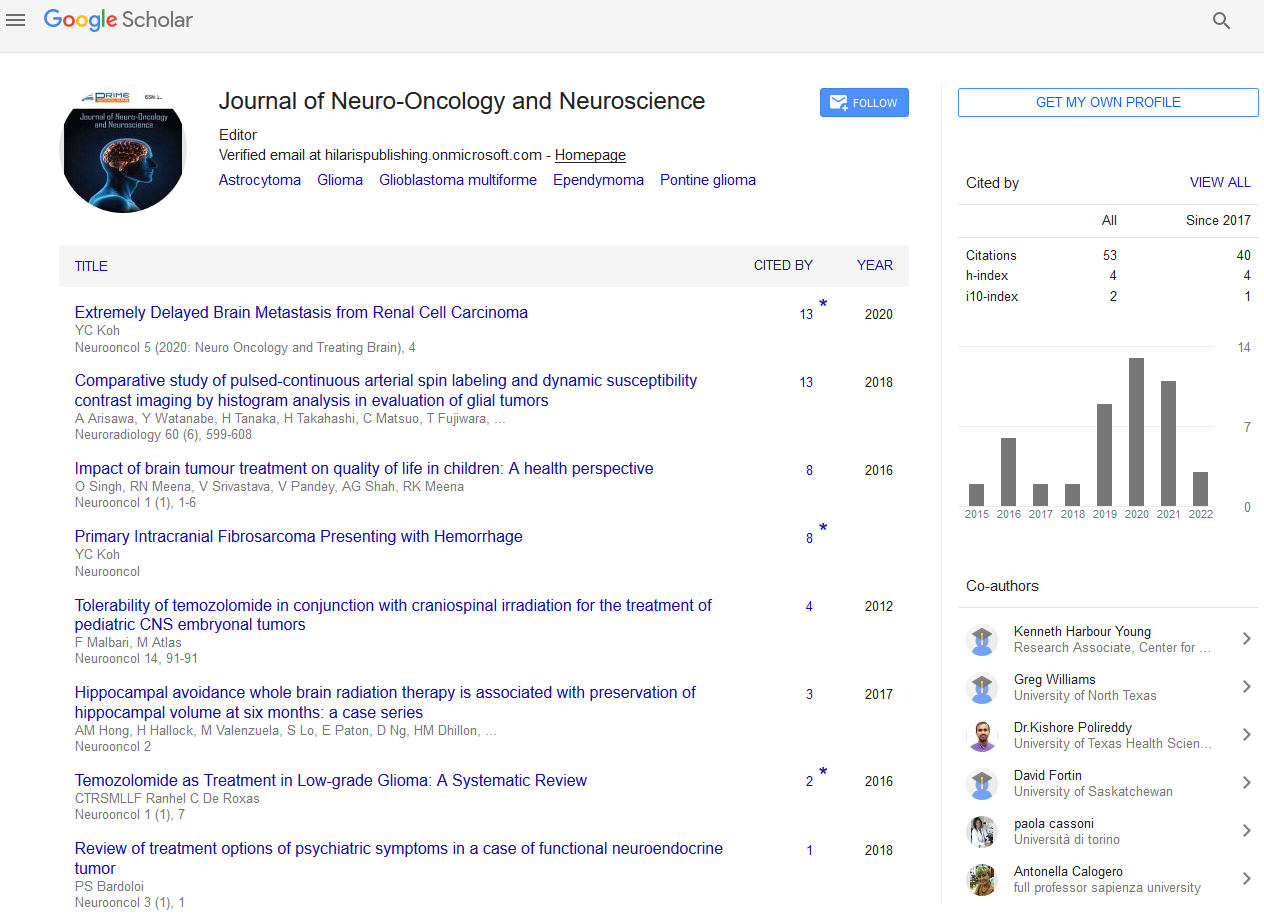Perspective Article - (2023) Volume 8, Issue 3
Breaking Barriers: Emerging Therapeutic Approaches for Brain Metastases
Matthew Hocking*
Department of Health Sciences, University of Minho, Braga, Portugal
*Correspondence:
Matthew Hocking,
Department of Health Sciences, University of Minho, Braga,
Portugal,
Email:
Received: 30-Aug-2023, Manuscript No. IPJNO-24-19614;
Editor assigned: 01-Sep-2023, Pre QC No. IPJNO-24-19614 (PQ);
Reviewed: 15-Sep-2023, QC No. IPJNO-24-19614;
Revised: 20-Sep-2023, Manuscript No. IPJNO-24-19614 (R);
Published:
27-Sep-2023, DOI: 10.21767/2572-0376.8.3.29
Introduction
Brain metastases represent a significant clinical challenge,
affecting up to 40% of cancer patients and contributing to
substantial morbidity and mortality. Historically, treatment
options for brain metastases have been limited, with surgery,
whole-brain radiation therapy (WBRT), and stereotactic
radiosurgery (SRS) serving as the mainstays of therapy.
However, recent advancements in understanding the molecular
mechanisms of brain metastasis and the development of
targeted therapies offer new hope for improving outcomes in
patients with this devastating condition. Emerging therapeutic
approaches are revolutionizing the management of brain
metastases, aiming to overcome treatment resistance, enhance
efficacy, and improve quality of life.
Description
One of the most significant developments in the field of
brain metastases is the advent of targeted therapies directed
against specific molecular alterations driving tumor growth
and progression. Molecular profiling of brain metastases has
revealed a diverse array of genetic mutations, amplifications,
and aberrant signalling pathways, many of which represent
druggable targets. For example, targeted inhibitors of the
epidermal growth factor receptor (EGFR), such as osimertinib
and afatinib, have shown efficacy in treating EGFR-mutant
brain metastases from non-small cell lung cancer (NSCLC),
leading to improved survival and quality of life for patients. In
addition to targeted therapies, immunotherapy has emerged
as a promising approach for the treatment of brain metastases,
harnessing the power of the immune system to recognize
and eliminate cancer cells. Checkpoint inhibitors, such as
pembrolizumab and nivolumab, have shown activity in treating
brain metastases from various primary tumor types, including
melanoma, NSCLC, and renal cell carcinoma. Moreover,
combination approaches incorporating immunotherapy with
targeted agents or radiation therapy have shown synergistic
effects in preclinical models and early-phase clinical trials,
offering new strategies to enhance treatment efficacy and
overcome resistance mechanisms.
Furthermore, advancements in radiation therapy techniques
have revolutionized the management of brain metastases,
allowing for more precise and conformal delivery of radiation
to tumor targets while sparing adjacent normal brain tissue.
Stereotactic radiosurgery (SRS), in particular, has become a
cornerstone of therapy for brain metastases, offering highdose,
focal radiation therapy in a single or few fractions. SRS
is associated with excellent local control rates and minimal
toxicity, making it an attractive option for patients with limited
intracranial disease burden. Moreover, the development
of hippocampal-sparing techniques and advanced imaging
modalities, such as magnetic resonance imaging (MRI) and
positron emission tomography (PET), enables more accurate
targeting of brain metastases while minimizing damage to critical
brain structures and normal tissues. These advancements not
only improve treatment outcomes but also reduce the risk of
cognitive decline and neurocognitive impairment associated
with radiation therapy, enhancing quality of life for patients
undergoing treatment for brain metastases.
Conclusion
Emerging therapeutic approaches are revolutionizing the
management of brain metastases, offering new hope for
patients facing this devastating condition. Targeted therapies,
immunotherapy, and advanced radiation techniques are
transforming the treatment landscape, improving outcomes and
quality of life for patients with brain metastases. By harnessing
the power of precision medicine and multidisciplinary
care, we strive to break barriers and provide effective and
compassionate treatment options for patients with brain
metastases, ultimately improving survival and quality of life for
those affected by this challenging disease.
Citation: Hocking M (2023) Breaking Barriers: Emerging Therapeutic Approaches for Brain Metastases. Neurooncol. 8:029.
Copyright: © 2023 Hocking M. This is an open-access article distributed under the terms of the Creative Commons Attribution License, which permits unrestricted use, distribution, and reproduction in any medium, provided the original author and source are credited.

